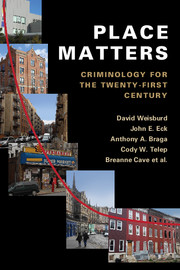Book contents
- Frontmatter
- Contents
- List of figures
- List of tables
- List of contributors
- Preface
- 1 Crime Places within Criminological Thought
- 2 The Concentration of Crime at Place
- 3 Theories of Crime and Place
- 4 The Importance of Place in Mainstream Criminology and Related Fields: Influences and Lessons to be Learned
- 5 Methods of Place-Based Research
- 6 Reducing Crime at High-Crime Places: Practice and Evidence
- 7 Crime Places in the Criminological Imagination
- Notes
- References
- Index
Preface
Published online by Cambridge University Press: 05 April 2016
- Frontmatter
- Contents
- List of figures
- List of tables
- List of contributors
- Preface
- 1 Crime Places within Criminological Thought
- 2 The Concentration of Crime at Place
- 3 Theories of Crime and Place
- 4 The Importance of Place in Mainstream Criminology and Related Fields: Influences and Lessons to be Learned
- 5 Methods of Place-Based Research
- 6 Reducing Crime at High-Crime Places: Practice and Evidence
- 7 Crime Places in the Criminological Imagination
- Notes
- References
- Index
Summary
We have titled this book Place Matters: Criminology for the Twenty-First Century. Our choice of this title was not coincidental. It reflects a view of all of the authors regarding what should be important in criminology and crime prevention. As we note in Chapter 1, the approach we offer is not a dominant one in traditional criminology. Indeed, it represents in many ways a radical departure from the mainstream of criminological thinking. But our purpose in developing this work was not to divorce ourselves from the mainstream of criminology, but rather to argue that our interests should become a central part of criminological interests. We make that case throughout the book in terms of what the empirical evidence says about basic and applied research in this area.
In his presidential address to the American Society of Criminology in 2003, John Laub (2004) observed that criminology as a discipline could be viewed as having a developmental life course. Laub and Sampson (2003) offered a radical critique of traditional criminological understandings of criminal careers when they argued that the life courses of criminals were affected not just in the early formative stages of their lives, but also by the experiences they would have as adults. The life-course perspective recognized that people would change many times in their lives, and an immutable idea of inevitable criminal behavior based on experiences in youth was just wrong. Laub (2004) argued that, much like the offenders that he and Robert Sampson studied in identifying life-course criminology (Laub and Sampson 2003), criminology also could be seen as having a life course that had important turning points that fundamentally influenced the directions that the field would take.
In contrast to continuity in the intellectual trajectory of the discipline, a turning point refers to a radical new way of viewing criminology, which allows us to stake out new territory and to make significant new discoveries about crime and criminality. A turning point in a discipline can be seen as a recognition that new ideas develop that are pursued, and often lead to important insights. The successful development of criminology is dependent on being open to new ways of understanding crime. Laub (2004) identifies a number of turning points that have enriched criminological understandings.
- Type
- Chapter
- Information
- Place MattersCriminology for the Twenty-First Century, pp. xvii - xxiiPublisher: Cambridge University PressPrint publication year: 2016



